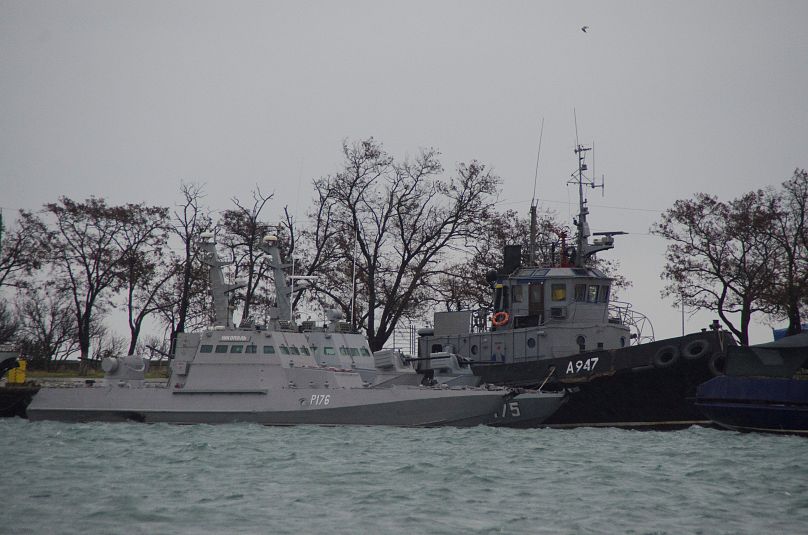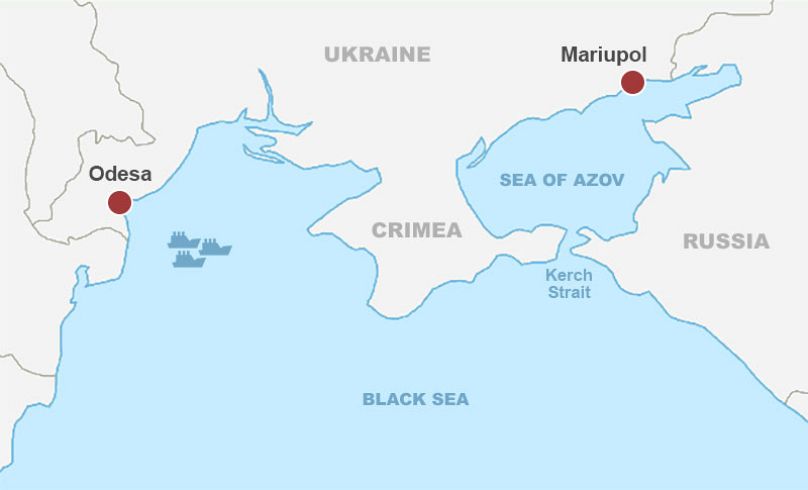Relations between Russia and Ukraine have been deteriorating over Moscow's seizure of three ships in the Sea of Azov. But what has happened, and how much can we expect it to escalate?
Relations between Russia and Ukraine have deteriorated this week after a naval clash in the Sea of Azov.
Moscow fired on and seized three Ukranian gunboats and said three sailors were injured, while Kyiv said six were wounded.
The confrontation took place on Sunday in the Kerch Strait when the Ukrainian ships sailed from Odessa to Mariupol, in the Sea of Azov, an area shared by the two countries.
The incident is a reminder of the tensions between the two nations that unfolded after Russia annexed the Crimean peninsula in 2014.
How did the Crimea crisis unfold?
After the toppling of the previous Ukranian president in a revolution in the country in 2014, Russia annexed Crimea.
The peninsula existed as a semi-autonomous region of Ukraine, with political bonds to Kyiv but strong cultural ties to Moscow.
When Russian leader Vladimir Putin announced the annex in 2014, Ukraine accused Russia of committing a war crime and the international community widely viewed the annexation as illegal.
The European Union described the move as "a gross violation of international law and of the territorial integrity of Ukraine."
The recent naval spat in the Kerch Strait has heightened tensions between the two countries.
Nicu Popescu, director of the Wider Europe Programme at the European Council on Foreign Relations, told Euronews that the security incident this weekend was more of an accident, not a deliberate step.
"Ukrainians sent some military boats, that's something they've been doing regularly over the last five years. Russia decided to tackle that in a more aggressive manner than before," Popescu said.
In response to the Kerch Strait spat, Ukraine's government imposed 30 days of martial law, which started Wednesday, across 10 regions bordering Russia to the east, and the Black and Azov seas to the south.
Ukraine called the incident "an act of aggression," but Russia maintains that the Ukrainian ships had trespassed in its waters.
Why has Russia targeted Crimea and why is the region important?
The peninsula is strategically important to Russia and the country has a naval base in Crimea.
Moscow's Black Sea Fleet is based in the city of Sevastopol and after the fall of the Soviet Union in 1991, Ukraine allowed Russia to continue its naval operations there.
The base gives Russia access to wider waters in the region.
Relations between Kyiv and Moscow have been tense since Crimea became part of Ukraine after the dissolution of the Soviet Union and it's reported the region still has a large Russian population.
Where is the Kerch Strait and why is it important to Russia and Ukraine?
The Kerch Strait lies between Russia and Crimea and is a gateway into the Sea of Azov.
Both countries have the right to patrol the waters and it is the site of a new Russian bridge, connecting Russia to Crimea.
It is vital to both countries as it separates the Crimean peninsula from the Russian mainland and is an important waterway connecting the Black and Azov seas.
What have Russia and Ukraine said about the tensions?
Ukraine has responded to tensions in Crimea by cutting ties with Russia and asking the West for support.
President Poroshenko said the international community must not accept Russia's aggressive policy, in an interview with German newspaper Bild.
"First it was Crimea, then eastern Ukraine, now he wants the Sea of Azov," Poroshenko said.
Poroshenko warned on national television on Tuesday of a full-scale war with Russia.
“I don’t want anyone to think this is fun and games. Ukraine is under threat of full-scale war with Russia," Poroshenko said.
In a further move, Ukraine banned the entry of Russian men aged 16-60 to prevent the forming of "private armies" on Ukranian soil.
Meanwhile, Putin said his forces were right to move in on the vessels, accusing Ukraine of illegally entering its waters.
He said Poroshenko was creating a naval “provocation” to boost his ratings ahead of presidential elections in the country in 2019.
Russian lawmaker Konstantin Kosachev, chairman of the international committee of Russia's Federation Council, said Moscow is not interested in military action with Ukraine and warned that tensions would escalate only if initiated by Kyiv, insisting a confrontation "will never happen on Russia's instigation."
Meanwhile, state media in Russia reported that Moscow has delivered a battalion of S-400 surface-to-air missiles to Crimea, and plans to build a new missile early-warning radar station there.
Putin insisted that Russia's military response was appropriate as the Ukrainians had "trespassed" into Russia's territorial waters.
What’s next for Russia and Ukraine?
Nicu Popescu, director of the Wider Europe Programme at the European Council on Foreign Relations, told Euronews that Russia's strategy is to keep "Ukraine down."
"The strategy is to make sure Ukraine does not get stronger and more prosperous. And that in five to six years the Ukrainian public will vote for more pro Russian forces," he said.
He added that Russia has a wide range of sanctions on Ukranian exports strangling Kyiv through ports in the Sea of Azov and pushing for economic destabilisation.
But Popescu said the European Council on Foreign Relations does not think the recent tensions are the first stage of a major escalation in tensions between Russia and Ukraine.
"The Azor sea problem will keep Europe, Russia [and] Ukraine busy for the next years both in a security and economic sense and it's not the last time we will hear about it," Popescu said.
"After Crimea and Donbass, the Azov sea is becoming Ukraine’s third front line which could destabilise Ukranian-Russia relations but also Europe security as a whole."
What happened to the seized Ukrainian ships and sailors?
Russia has indicated plans to charge the sailors. State television broadcasted interrogations with sailors on Tuesday, showing what appeared to be confessions.
“I recognise that the actions of the ships with military hardware of Ukraine’s navy had a provocative character,” said one Ukranian sailor, Vladimir Lisov.
“I was carrying out an order.”
Ukraine’s foreign minister, Pavlo Klimkin told the Associated Press it denounced what it described as forced confessions.













